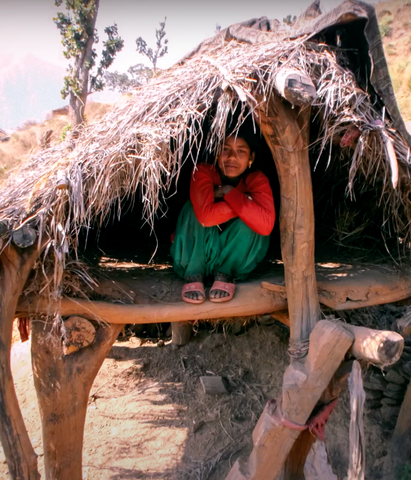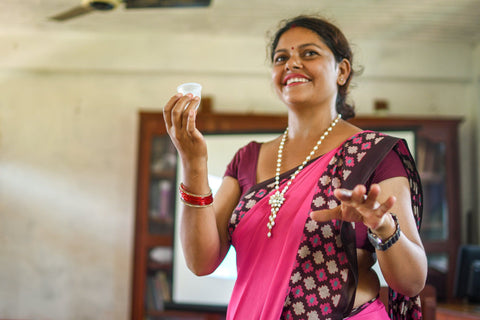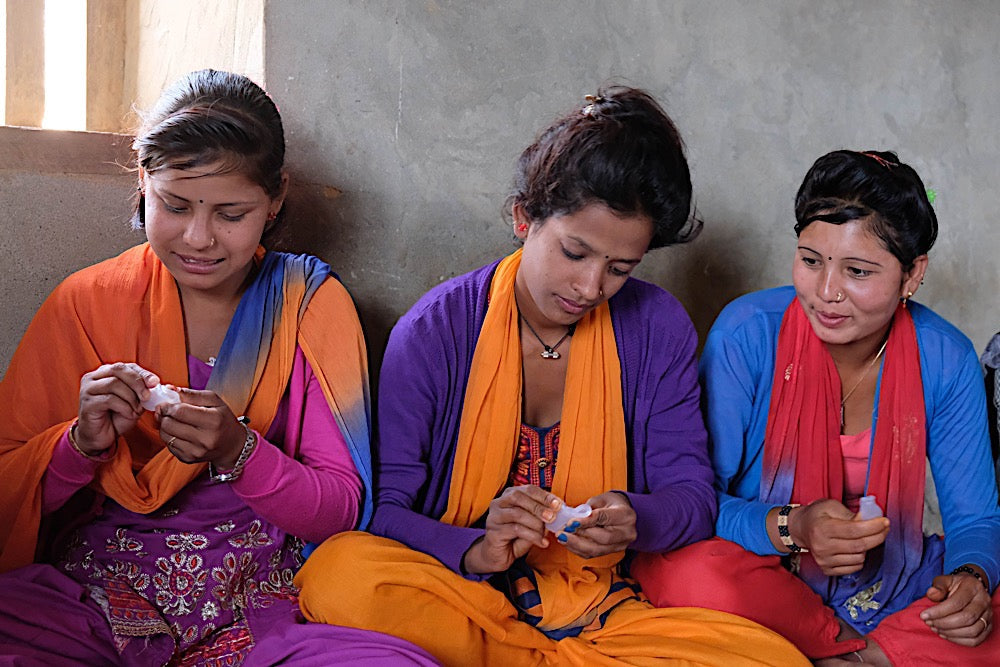Be Artsy is a Catalan NGO that focuses on women's issues and develops creative projects that aims to empower local communities through art. They have successfully distributed over 3000 Ruby Cups in Nepal since 2016.
We had a chat with Clara Garcia i Ortés, founder and CEO at BeArtsy, about her Rato Baltin project, which was kickstarted by her belief that she could help girls and women in Western Nepal with menstrual cups.
"Our project Rato Baltin seeks to eradicate menstrual poverty in Nepal through menstrual and sex education, participative photography, and menstrual cups, giving women their dignity back and avoiding social exclusion" Says Clara.

What is Be Artsy, and who is behind it?
Be Artsy is a small Catalan NGO with a BIG project in Nepal. We are a group of different people with a common goal:
To use art as a tool for reflection and change.
What is the Rato Baltin project?
We decided to call it the Rato Baltin project (Red bucket in Nepali), because the color red is very relevant in Nepal, it's also the color of menstruation and because we give the training kit in a bucket. The kit consists of a bucket, a menstrual cup, a towel, and soap. The bucket is intended to carry water to clean the cup or to boil and sterilize the cup once a month.

The project creates a safe space for girls to talk about their menstruation, their thoughts, capture the reality that surrounds them, and how some normal, everyday activities present challenges.
Through photography, they transmit positive values and produce messages to sensitize the society around us. The Rato Baltin project seeks to eradicate the Chhaupadi practice in Nepal.
What is the Chhaupadi practice in Nepal?
In Nepal, placing menstruating girls and women in sheds or huts is a centuries-old tradition called Chhaupadi. During their periods, women are considered impure, dirty, contaminated, and bad luck.
They can’t touch their husbands, other family members, water sources, fruit trees, or cattle, among other things.The belief that menstruation is impure is so deep-seated that families overlook the extreme risks involved in the practice.

Extreme temperatures expose them to health problems, including pneumonia, diarrhea, chest and respiratory tract infection. Every year 3 or 4 women die, during this practice, because of asphyxiation, hypothermia, snakebites, or other wild animal attacks, and nobody knows the true numbers of how many are raped.
The Chhaupadi tradition is supported by community elders, husbands, mothers-in-law, traditional healers, and priests who have a profound influence in the community.
Villagers believe that letting menstruating women inside the family house will infuriate the gods and will have consequences for both families and the entire community.

How does the Rato Baltin project work?
The Rato Baltin Project is a Menstrual Health Management and sexual education program that aims to eradicate the chhaupadi tradition. 2021 was our fifth year working with the community, health workers, teachers, political leaders and local NGOs to this end.
We think that education is the only way to change these deeply held beliefs. With participative photography we invite them to speak about their menstruation. An important part of the project is the distribution of a healthy and environmentally friendly solution: the menstrual cup.

Our goal is to destigmatize menstruation as a normal biological function, reduce the prevalence of chhaupadi, and mitigate its consequences. Through these ends, girls and women are also empowered with the confidence to continue to attend school and be active in public spaces.
Why do you use menstrual cups as a solution to menstrual management in places like Nepal?
In the remote area where we work, 40 hours by bus from Kathmandu, women don’t use any products for menstruation or use old rags.
With menstrual cups, they only need a glass of water to drink and can go to the forest to empty and clean their cups, they are not allowed to use the bathroom during their period. Plus, they stay clean all day and it's a big change in their quality of life.

Why are the menstrual health and sexual education workshops important?
Menstrual health education is necessary for girls and women to understand how their body works.
Without that education, they have a negative view of what their menstruation is. With the workshops they fully understand that it is a natural process and are prepared to experience their menstruation positively.

Has your relationship or view on your period changed after working with Be Artsy?
The big change was before when I started using menstrual cups, many years ago. That was a revolution and the reason why I've created the Rato Baltin Project.
Working with Be Artsy has led me to realize that all women in the world don't have information about menstruation. We have to normalize it and don't take for granted that today, it's easier.

Tell us a lesson you have learned from be artsy and what you feel proud of?
I am very proud of all the girls who help us at Achham, our mentors and our trainers. When they were students, they would blush if we talked to them about menstruation.
And the following year, they began to teach their classmates how to put a condom on, what is the clitoris, how are the organs both male and female sex, and they do it with power, determination and without shame.
Just for those girls, it is worth it, all the difficulties we go through to get there.

If someone wants to be part of the organization and help, you are always welcome!
 Your Account
Accedi
Your Account
Accedi
 Basket
Basket

